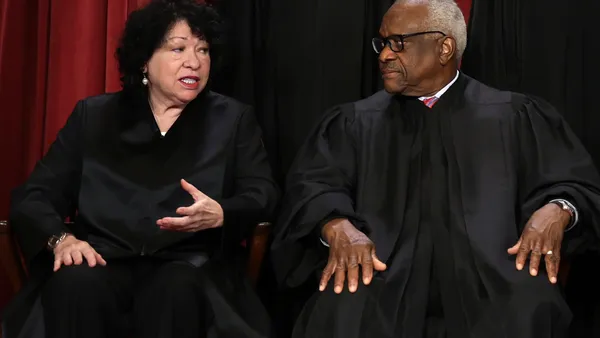Dive Brief:
- Chemical manufacturer BASF Corp. did not violate the Americans with Disabilities Act when it required an employee to comply with its COVID-19 preventative measures, the 5th U.S. Circuit Court of Appeals held Oct. 10 in Chancey v. BASF.
- In August 2021, BASF allegedly began enforcing a COVID policy in line with U.S. Equal Employment Opportunity Commission guidance, according to court documents. The policy included masking requirements, social distancing, handwashing, temperature checks and answering inquiries about vaccine status, the court record said. An engineer refused to comply and allegedly spoke to supervisors and the HR department about alternative protective measures. He claimed that after BASF investigated his request, it retaliated against him by treating him as a “safety hazard” and a “direct threat,” denied him access to certain work spaces and asked him to submit to weekly COVID tests at his own expense, according to the record.
- The engineer sued BASF, alleging it violated the ADA because it regarded him as having “a deadly and contagious disease” or an impaired immune or respiratory system. A federal district court dismissed the case; the 5th Circuit affirmed. An employee doesn’t state a cause of action for disability discrimination merely by alleging they are at risk for developing a condition, the 5th Circuit said. Similarly, an employee doesn’t state a “regarded as” claim by alleging their employer believes they may contract a virus in the future, the panel pointed out, citing an 11th Circuit ruling.
Dive Insight:
COVID may no longer be a public health emergency, per the May 11 White House directive, but employers and HR professionals may still see its effects in the workplace.
One reason is long COVID, a term used to describe long-term symptoms that continue after the acute infection has passed. “Long haulers,” as they sometimes call themselves, can suffer a wide range of ongoing health problems lasting weeks, months or years, the Centers for Disease Control and Prevention has said. Symptoms may include tiredness or fatigue that interferes with daily life or gets worse after mental or physical effort, heart palpitations, brain fog or digestive problems.
In the context of the ADA, long COVID can be a disability if it substantially affects one or more major life activities, the U.S. Departments of Justice and Health and Human Services said in 2021. Last month, the EEOC sued Appliance Factory, which operates a chain of appliance stores, alleging it failed to accommodate a sales associate’s long COVID, in violation of the ADA.
According to the lawsuit, the sales associate asked for an additional one to two weeks of leave to accommodate her symptoms. Appliance Factory allegedly refused to grant the request and failed to communicate with her about the precise nature of her condition or what alternative accommodation could be made to meet her needs, the EEOC explained in a press release. The company then allegedly fired her when her leave expired.
Evolving legal requirements regarding vaccine mandates are another area HR professionals may need to keep an eye on. For example, in January 2022, the U.S. Supreme Court essentially halted the Occupational Safety and Health Administration’s emergency temporary standard, mandating COVID vaccines for 84 million workers in the U.S. Following the ruling, OSHA withdrew the ETS.
EEOC reminded employers in its May update to the agency’s COVID guidances that federal EEO laws don’t prevent an employer from requiring employees to be vaccinated against COVID, subject to the requirements of the ADA and Title VII of the Civil Rights Act of 1964. Under these requirements, absent undue hardship to the employer’s business operations, an employer must provide a reasonable accommodation for employees who, because of a disability or a sincerely held religious belief, practice or observance, object to being vaccinated.
At the state level, however, a growing number of legislatures have banned vaccine mandates. For example, in Florida, effective June 1, businesses, government bodies and educational institutions are barred from requiring COVID vaccinations or testing as a condition of employment, according an AARP Oct. 20 round-up of state laws. The same measure bars private and public-sector entities from imposing mask mandates, AARP says, although there are exceptions for the health care industry, according to a June post from Jackson Lewis.











